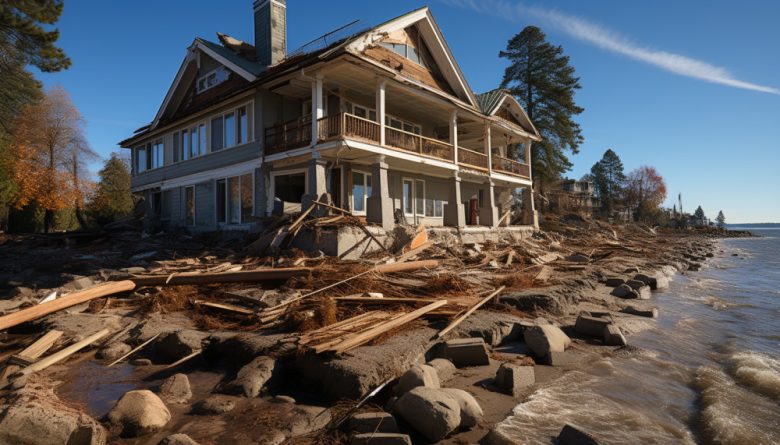A beach home isn’t just property, it’s a sanctuary where summers stretch long, laughter lingers, and memories salt the air. But owning a home so close to the ocean also means living side-by-side with its wild moods.
So while your beach house protects your family’s memories, it’s your job to protect the house itself and that begins with the right insurance coverage.
Let’s unpack the key differences between standard home insurance and coastal coverage, explore what factors shape your premiums, and dive into the top insurance policies that can keep your beach retreat safe from the unexpected.
Standard Homeowners Insurance vs. Beach House Insurance
Insuring a beach house isn’t the same as insuring your year-round home is not even close.
Most insurance carriers categorize coastal or waterfront properties as high-risk, which means they’re more vulnerable to damage from storms, flooding, and salty air. That extra exposure translates to higher premiums and often, separate policies.
Think of it this way: a standard homeowners policy protects you from everyday risks of fire, theft, liability. A beach house policy, on the other hand, must take into account the ocean’s temperament, hurricanes, tropical storms, storm surges, and saltwater corrosion.
In short: more risk, more complexity and often, more cost.
What Impacts the Cost and Coverage of Beach House Insurance?
Two main factors can significantly affect how insurers view your beach property:
1.Distance from the Shoreline
The closer your home sits to the water, the higher the risk and the higher the premium. Homes right on the beach, or within flood-prone zones, are often difficult (and expensive) to insure. Some insurance providers may even decline coverage entirely if the property is too close to the ocean.
2.The Age of the Home
Old beach homes carry a certain romantic charm: driftwood porches, weathered shutters, the scent of salt in the walls. But that charm comes with baggage.
Years of exposure to wind, moisture, and salt air can quietly erode structural elements, wiring, and plumbing. And insurers know it. That’s why older coastal homes often face steeper premiums than newer, storm-hardened builds.
The Best Insurance Options for Your Beach House
When it comes to protecting your coastal getaway, layered coverage is key. No single policy will cover everything, so it’s best to build a blend of protections that match your home’s risks and location.
Here are the top types of insurance every beach homeowner should consider:
1.Homeowners or Vacation Home Insurance
Your foundation policy is the one that covers the basics.
A homeowners or vacation home insurance policy typically protects your property from damages to the interior, exterior, and personal belongings. It can also shield you from liability if someone gets injured on your property even if it’s just a friend slipping on wet deck stairs after a beach barbecue.
While this type of policy forms the cornerstone of your protection, it often excludes specific coastal perils like flooding or windstorms which brings us to the next types of coverage.
2.Flood Insurance
If your beach home has one natural enemy, it’s water.
Because most homeowners policies don’t cover flood damage, having flood insurance is absolutely essential for any property near the coast. Even a few inches of seawater can cost tens of thousands of dollars in repairs.
Flood insurance typically covers:
Electrical and plumbing systems
Water heaters and major appliances
Built-in carpeting, cabinets, and staircases
Foundations and detached garages
Solar and fuel equipment
Just note: it covers damage directly caused by flooding not burst pipes or sewer backups. Those fall under different policies.
3.Windstorm Insurance
If you’ve ever watched palm trees bend sideways during a hurricane warning, you already understand why windstorm insurance matters.
This policy helps cover damage caused by strong winds, hail, hurricanes, and tornadoes including repairs to your home’s structure and the replacement of personal items affected by wind-related events.
Keep in mind: while flooding often follows wind damage, windstorm insurance won’t cover water-related losses. You’ll need both flood and windstorm coverage for full protection.
4.Hurricane Insurance
For homeowners in hurricane-prone regions, a hurricane insurance policy offers broader protection that can combine aspects of both wind and flood coverage.
It’s designed to protect against the unique chaos hurricanes bring flying debris, water surges, and high-speed winds that can turn a peaceful shore into a disaster zone.
That said, some insurers still require you to hold separate flood insurance, since hurricane-related water damage can be extremely costly. (A single inch of floodwater can cause over $10,000 in repairs, an expense no one wants to face out of pocket.)
The Bottom Line: Protecting Paradise
Your beach home may be where you go to escape the world but that doesn’t mean it’s immune to it. Salt, storms, and shifting tides can all take a toll.
The right beach house insurance plan isn’t just about meeting requirements; it’s about peace of mind. Knowing that your coastal haven the laughter, the sunburns, the late-night waves is protected no matter what the ocean throws your way.
If you’re unsure where to start, reach out to the Anderson Insurance Agency team. We’ll help you find the perfect blend of coverage that fits your beach home, your budget, and your peace of mind.



